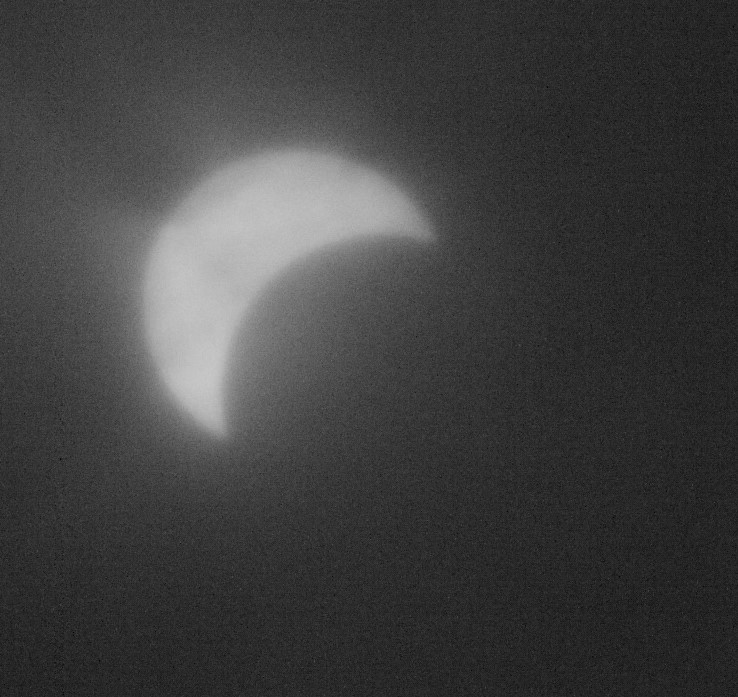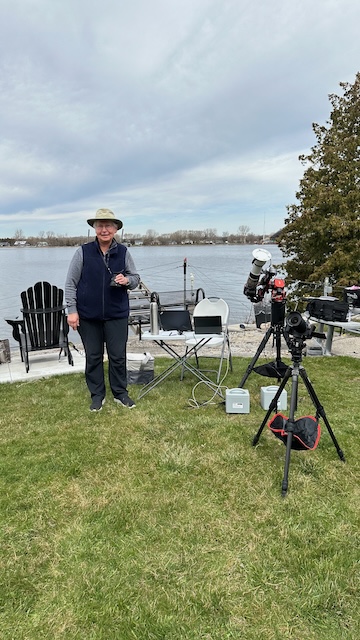A week ago, like many of you, I packed up the car and headed out to what I thought was a good location to view the total solar eclipse. The first one in my area since 1979, it promised to be epic, if you found the right location.

Well I did and I didn’t. The location was good – open space, near water, where we would see everything surrounding us. The problem was clouds. They thickened as we were setting up and completely engulfed us at totality. No corona shots, no Bailey’s beads, no diamond ring, no nothing.
I learned a few things from this experience and thought I would share them.
I’m old enough now not to have high expectations for anything and not to be disappointed if something doesn’t turn out as planned. But as I’ve watched the vlogs over the past week of people I follow who did find the perfect location with the perfect sky, I must admit that I am disappointed that I didn’t do more to get a good result.
I had made a decision months ago that I would travel no more than a two hour drive from home to find a good location. I also made the decision that travelling across the Greater Toronto Area from east to west would not be on the agenda. I really do hate driving across the city. It can take hours. And yet, everyone who follows eclipses said you must be flexible, and be prepared to go almost anywhere based on a morning forecast the day of. So in hindsight, I think I should have been just a bit more flexible BUT…

These big events are best spent with friends, and they had kindly arranged access to the location where we went. I was thankful to have a location with an onsite restroom and no need to fight crowds. I had ample space, easy access from the car and plenty of time to get ready. Another possible flaw in my thinking – not being interested in inconvenience – but at this stage of my life, I don’t like unplanned surprises. It’s hard enough to be ready for the expected. But that flexibility thing keeps coming back at me.
I had rehearsed over several months, decided to use multiple cameras, and learned how to automate my photography across those multiple cameras. So my main task would be just to keep an eye on things, not to actually operate the equipment. That would also give me the chance to simply enjoy the eclipse.
That part of the plan worked really well. With one exception – read on. On the positive side, I had discovered new things about my collection of cameras – that each one had automated sequences for timelapse, bracketed exposures and interval timed shots. In some cases, the automation sequences worked hand in hand with each other or with manual control. Sweet. I also discovered a simple spreadsheet based automation for my computer that a smart person had written to script every possible shot during the eclipse. You tether your camera to a computer, fire it up and away you go. I tested it and it worked flawlessly with my camera. I felt really good that I could get all the shots and footage I had planned, and still enjoy the show. I was ready.

But I made one big mistake. Cameras, like computers, have operating systems called firmware. Canon had released new firmware for my camera a couple weeks before the eclipse. I had always updated it as soon as I discovered it (which in this case was on April 6th) and did so again. I did not retest my tethered computer connection with the new firmware and discovered on the day of the eclipse that one part of my flawless execution was now compromised. I was using a “dummy” battery to provide constant power to the camera. With the firmware upgrade, that particular dummy battery no longer worked. I discovered that on eclipse day, 1 hour before the big show. Luckily, I had brought lots of traditional batteries with me too and was now forced to switch out batteries as needed during the event. It worked out ok though.

All set up and ready to go despite the clouds, we turned on our cameras and fired away at the appointed time. It was important to try to get the shot no matter what. We could throw them away later. I have thrown away most of those stills and video footage now, but a few things were worth keeping: shots of the changing light levels during totality, shots and footage of me and my friends reacting to what we could see. It was priceless and these will remain in my archives forever. But as many eclipse observers said, it is the experience you don’t forget. They are right. But I’m also glad that my practice and preparation did work out well.

We are not usually aware of the role the sun plays in our daily lives, except when it is too grey and drab in winter or too hot in summer. We don’t consciously think of our place in the universe or that our dot of a planet is subject to all of the physical forces of that universe. I think that was the big revelation during the eclipse as we lost our source of light for those brief moments. Were it not for the sun, this world as we know it would not exist. There is nothing so humbling as the force of nature.
I still hope to actually see a total solar eclipse someday. The next opportunity might be in Iceland in 2026. Hmmm, from not wanting to drive across the city to going to Iceland? Seems a big leap. Who knows.

Live and learn, and live and laugh. Best way to get through life!
LikeLike